Table of contents
- What is Microsoft 365
- Does Microsoft 365 collect data
- What data does Microsoft 365 collect
- Where is your data stored in Microsoft 365
- Is your data safe in Microsoft 365
- Can you trust Microsoft 365 with your data
- Can companies spy on Microsoft teams
- What can your employer see on Microsoft Teams
- Are Microsoft Teams calls recorded automatically
- Conclusion
What is Microsoft 365
Microsoft 365 is a suite of tools featured on Microsoft’s Windows operating system. These apps and services are cloud-based and mainly focus on productivity—for business and personal use. Microsoft 365 contains office apps, calendar and email services, cloud storage, collaboration tools, and security features.
Some of the most common tools in the suite include Word, Excel, PowerPoint, Outlook, and Microsoft Teams.
Does Microsoft 365 collect data
Yes, Microsoft 365 does collect data. Microsoft claims its data collection policy is focused on improving the services within the Microsoft 365 suite of tools. They use data collection to make the following improvements:
- Service functionality: Data collection ensures certain functionality within its tools are in working order.
- User experience: Microsoft may collect data to assess and improve how users interact with the tools in the suite.
- Security: Data collection assesses the safety of the Microsoft 365 environment. This can include monitoring for security threats and malware.
- Personalization: Microsoft collects your data to help personalize the user experience by providing recommendations and suggestions based on user activities.
What data does Microsoft 365 collect
Microsoft 365 collects a variety of different user data. Since the tools and services featured in Microsoft 365 are so diverse, the data collected to help improve these tools has to also be wide-ranging.
Here’s the type of data that Microsoft 365 collects:
- Account user data: This can include user names, email addresses, and contact information associated with your Microsoft accounts.
- Usage data: This usually entails information about how you interact with Microsoft 365 tools, such as features you use, how often, and for how long.
- Content: This is all the data created using Microsoft 365 tools, like documents, spreadsheets, emails, and other files.
- Device info: This is particularly about the devices you use to access Microsoft 365, like the type of device, your operating system, and device identifiers.
- Location info: If you use location-based services, Microsoft may collect location data.
- Diagnostic data: This includes error reports and diagnostic logs related to the performance of Microsoft 365.
- Communication data: This data relates to all the Microsoft 365 services that involve any form of communication, including Outlook (email) and Teams (calls and messaging).
- Security data: This data involves information related to security threats, including data used to identify and respond to security threats.
The personal nature of this data leaves you inherently vulnerable to certain risks. Microsoft's data collection policies focus on improving their products, but hackers can also engage in Microsoft 365 spying. They can install spyware tools on your device to gain access to your sensitive information. Though spyware is illegal, hackers are not exactly famous for their law-abiding nature.
Clario AntiSpy features a Spyware scan that quickly scans your device to check for spying threats. The tool gives you an overview of your vulnerability to spying and helps you remove the threat.
Here’s how to run a deep Spyware scan on your Windows device:
- Download Clario AntiSpy on your device and get a subscription to create an account.
- Click Anti Spy scan and wait for Clario to check your computer.
- If a scan detects any threats, follow the on-screen instructions to fix them.

Where is your data stored in Microsoft 365
Your Microsoft 365 data is typically stored in Microsoft’s data centers, which are located all over the world. This data is called telemetry data, or data collected from remote devices and sent to a central system for analysis. Because Microsoft 365 is cloud-based, your data is not stored on your device.
Is your data safe in Microsoft 365
Generally, your data is safe in Microsoft 365. Microsoft takes extensive measures to ensure the safety and privacy of your data with measures like data encryption, compliance and certifications, multi-factor authentication, and threat protection services. Though Microsoft collects your data, it claims to use it expressly for improving user experience—not spying.
With that said, though Microsoft’s data collection isn’t spying per se, its policies have been criticized by the cybersecurity community in the past for aggressive data collection. This may warrant apprehension in some users, considering the variety of private data Microsoft 365 collects on its users.
Can you trust Microsoft 365 with your data
Generally you can trust Microsoft 365 with your data. Though Microsoft 365 collects a lot of personal data, Microsoft claims they only use it to improve its products. However, before jumping to conclusions, let’s weigh the options.
Microsoft is a major tech company that heavily invests in security measures and its products are used by businesses and individuals worldwide. With such positive standing, you can be assured that Microsoft is highly motivated to retain user confidence in its products—and privacy policies.
But at the same time, the Windows 10 operating system was heavily criticized for its data collection. The backlash resulted in policy changes and the introduction of new security tools. Though Windows 11 didn’t receive the same flak, the experience with its predecessor left some users with a bad impression.
Ultimately, the decision to trust Microsoft 365 has a lot of variables to consider. Think about the data you reveal in the suite of tools, consider Microsoft's reputation and policies—past and present—and make the decision from there.
Microsoft shouldn’t be your only concern when it comes to Microsoft 365 spying—you should be wary of your employer or other companies, too. Learning how to check if someone is spying on your computer is a start—but practicing steps to prevent spying attempts altogether is a better long-term strategy.
Can companies spy on Microsoft teams
Yes, companies can spy on Microsoft Teams. Companies can generally monitor the tools within their organization, including Teams, the collaboration tool featured in Microsoft 365. Administrative controls enable companies to manage and monitor the platform to ensure employees are using Teams in accordance with company policies.
What can your employer see on Microsoft Teams
With the rise of home office policies, you're probably wondering if your employer can spy on you at home. Unfortunately, if you use Microsoft Teams for work, the answer is yes. Microsoft 365 can track your activity, and your employer can access that data with administrative controls.
Here’s what your employer can see on Microsoft Teams:
- User activity and presence: Employers can see when you're online, offline, away, and when you were last logged in.
- Channels and chats: Employers can access and monitor messages in your channels and private chats, including attachments.
- Meeting and calls: Employers may have certain information about your meetings and calls, including who participated and the duration of the interaction.
- Compliance and security features: Employers may use compliance and safety features to monitor and audit your activity on Team to make sure it complies with company policy.
- Integrations with other Microsoft 365 tools: Employers may have access to data from other tools that are linked to Teams, like SharePoint and OneDrive.
Are Microsoft Teams calls recorded automatically
No, Microsoft Teams calls are not recorded automatically. However, administrators may configure organization policies to control whether users are allowed to record meetings. They may also set up automatic recordings for certain types of meetings.
Conclusion
Your data is valuable—and Microsoft 365 contains a lot of it. When defending yourself from Microsoft 365 spying, you have many angles to consider. There are hackers, your employer, and even Microsoft itself. Limit the data you have available on 365, then protect yourself with Clario AntiSpy.
Cybersecurity experts created the suite of cybersecurity tools featured in Clario AntiSpy and offers a multifaceted approach to defending your device and data. Our data breach monitor will detect threats in real-time, while the spyware scan will look out for signs of spying apps. To comprehensively protect your device and data, cover all your bases with Clario AntiSpy.


